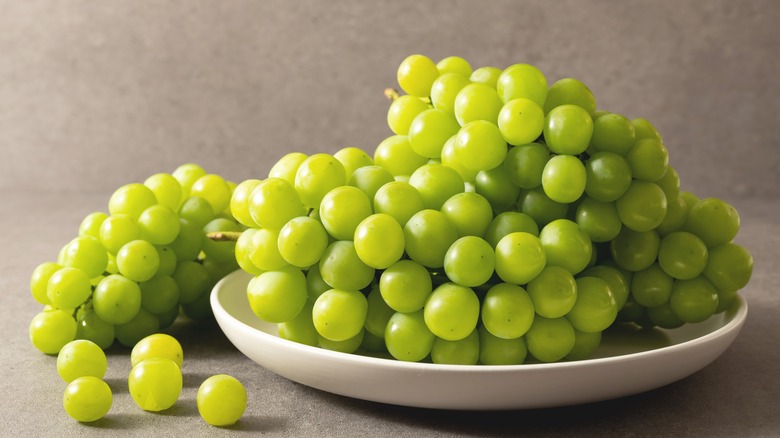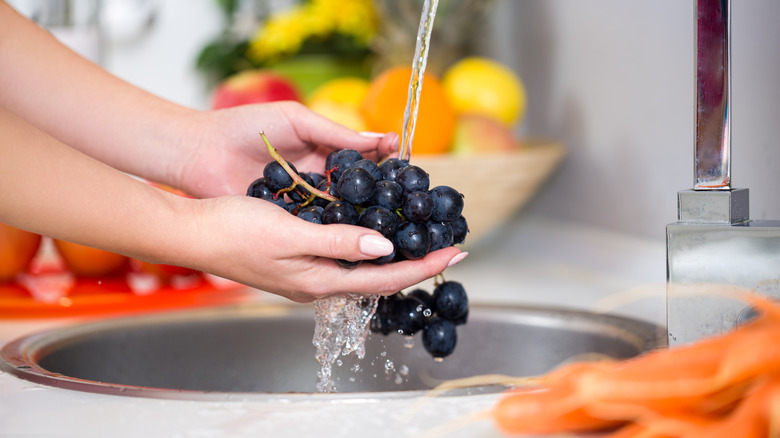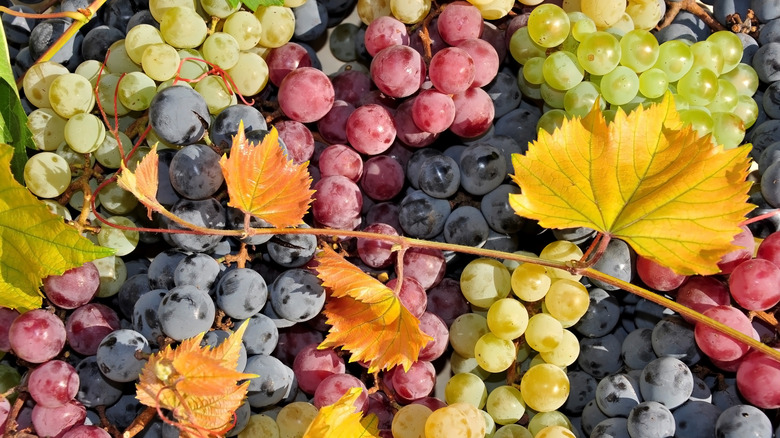The Extra Step You Need To Clean A Bunch Of Grapes Right
When cleaning a bunch of grapes, many of us assume that a quick rinse with cool water is good enough. A rinse may be better than nothing, but it's far from the ideal method for cleaning this fruit. Instead, just like how you might clean strawberries with a saltwater scrub, the best way to wash grapes is with a mixture of water, salt, and baking soda. To do so, first rinse your grapes with water, then put them in a bowl and cover them with a teaspoon each of salt and baking soda. Lightly shake and scrub the grapes and rinse again to remove the salt and baking soda, as well as any residue that might have been on the grapes.
Alternatively, you can soak your grapes in a mixture of these ingredients. Either way, after applying the salt and baking soda, you should gently rub and shake the grapes, ensuring that you wash away any dirt, bugs, or pesticides. Once the grapes have been rinsed thoroughly and allowed to drain, they're ready to be eaten.
As is the case with all other produce, you shouldn't soak your fruit before storing it in the fridge. Doing so increases the moisture in and around the grapes, encouraging bacterial growth and speeding up the processes of decay. Instead, only wash your grapes right before you're going to eat them.
Can you wash grapes with other ingredients?
Though salt and baking soda work very well to clean grapes, others tout a mixture of water, baking soda, and vinegar for similar results. Vinegar contains acetic acid, which can break down some dirt and oils, but it's not great at actually disinfecting. Per Healthline, vinegar may help reduce the presence of bacteria like listeria, E. coli, and salmonella (all potentially present on produce, according to the CDC), but it won't remove all pathogens. What's more, MSU's Center for Research on Ingredient Safety points out that vinegar could potentially have harmful reactions with certain pesticides found on produce, so using vinegar is not ideal.
Others have recommended cleaning produce with baking soda and lemon juice, as the lemon juice offers a similar but less offensive-tasting result compared to vinegar. However, while lemons contain citric acid, which can aid in cleaning, the acid is not nearly concentrated enough to qualify as a disinfectant. Unfortunately, a 2019 study has shown citric acid to be a rather ineffective method of removing pesticides. Again, this is not an ideal cleaning method, and baking soda and salt are more thorough.
How important is it really to wash grapes?
While washing produce is always a good idea, the Environmental Protection Agency has stated that pesticide residue left on produce is so minimal that it isn't a legitimate health risk. As such, the FDA recommends a simple rinse and light scrubbing of produce with water, with no extra cleaning steps. Rinsing removes most of the dirt on produce, as well as most bacteria present, but it does not kill said bacteria, which is arguably what many of us are worried about.
Enter the aforementioned baking soda. Shown in research to be an effective antibacterial agent, baking soda removes more bacteria (as well as pesticides) than rinsing alone, according to a 2017 study. This is because baking soda is an alkaline substance, meaning it's ideal for breaking down organic contaminates like bacteria and dirt. Such breakdown allows for easier removal than attempting to rinse the material off in its natural state.
Although a gentle rinse with water is technically enough to reduce any contaminants to a safe level, you can take your cleaning a step further by using baking soda. In relation to grapes, baking soda can also help remove the waxy protective layer on the outside of this fruit, eliminating any bitter or chalky notes.



